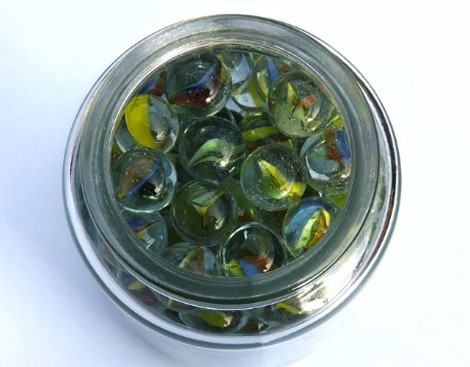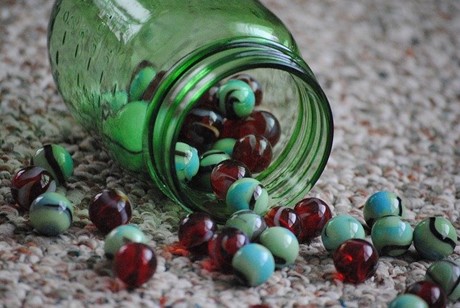
Brené Brown has a helpful metaphor for understanding relationships: the marble jar.1
Whenever you build a relationship with someone (a romantic partner, a friend, a colleague) imagine that you and the other person are working together to fill up a jar of marbles.
With every interaction, you each have a choice: You can add to the marble jar, take from the marble jar, or break the marble jar.
Adding Marbles
Investing in a relationship is the act of slowly and steadily adding marbles to the jar. Every positive interaction – each kind word, each act of generosity, each shared joy – adds to the marble jar.
There’s no limit to how much you can add; the relationship grows to provide the space you need.
But you do have to be patient because you’re only allowed to add a small handful of marbles each day. Developing a strong relationship takes time.
Taking Marbles Away
Negative interactions remove marbles from the jar. Behaviors like criticizing, belittling, or ignoring the other person will take marbles away.
And negative interactions tend to outweigh positive ones. They linger in our thoughts and stick in our memories. They can leave scars.
So while a positive interaction might add one or two marbles to the jar, a negative interaction will often remove several marbles. This is why relationship expert John Gottman has found the couples are much more likely to stay together if they have a 5-to-1 ratio of positive to negative interactions.2
But this isn’t just about romantic relationships. It also applies to friendships, relationships within your family, and professional relationships. In all these cases, we’d be wise to remember that, at best, we can add a handful of marbles to the jar each day, and, at worst, we can ruin everything in an instant.
Breaking the Jar
Some words and actions are so bad that they do not merely remove marbles from the jar – they effectively throw the jar onto the ground, shattering it and the relationship it represented.
Behaviors like angrily telling someone off, dishonesty, or romantic infidelity are often bad enough to break the marble jar. Some things are too painful to recover from.
Resilience and Fragility
But not all relationships are created equal. Some are more resilient than others. In this metaphor, a jar that has a lot of marbles in it is generally more resilient to breaking.
A couple with a long and deep relationship can survive a serious rough patch. The jar might fall onto the floor, spilling many of its marbles, but it won’t break. They can pick it up, set it back on the table, and resume adding marbles. Healing will take time, of course, because you can’t refill the jar all at once.

New relationships are fragile because the jar starts out empty. You might have a few positive interactions, adding a few marbles, but then have a negative interaction, and the jar is empty again. If you have a negative interaction when the jar is empty, the relationship will probably end immediately.
I’ve experienced this in my work as a tutor. If I’ve been working with a student for many months or even years, and we have a good rapport, I can engage them in a tough conversation about their choices and the consequences of those choices. There’s enough trust that they can listen without feeling too judged. I might be taking a few marbles out of the jar, but there’s enough in there to provide a good buffer.
But if I try to have a similar conversation with a student whom I’ve only just met, the message will go unheard and they will probably stop working with me. You can’t remove marbles from an empty jar.
Unlimited Supply

Your supply of marbles is not limited, and removing marbles from the jar does not increase your supply. In fact, the opposite happens.
Negative interactions tend to beget negative interactions, and tit-for-tat removal can spiral out of control until the jar is empty.
It’s far better, then, to do the opposite of what your instincts tell you to do when you feel compelled to withdraw marbles. Just as taking action when you feel unmotivated creates motivation, adding marbles to the jar when you feel that you have no marbles to give increases your supply.
Positive interactions beget positive interactions.
Kindness begets kindness.
1 Brown, Brené. Daring Greatly: How the Courage to Be Vulnerable Transforms the Way We Live, Love, Parent, and Lead. Avery, 2015.
2 Benson, Kyle. “The Magic Relationship Ratio, According to Science.” The Gottman Institute. October 4, 2017.
